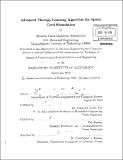Advanced therapy learning algorithm for spinal cord stimulation
Author(s)
Gaudreau Balderrama, Amanda Dawn
DownloadFull printable version (10.04Mb)
Alternative title
Advanced therapy learning algorithm for SCS
Other Contributors
Massachusetts Institute of Technology. Dept. of Electrical Engineering and Computer Science.
Advisor
Collin M. Stultz and Eric Panken.
Terms of use
Metadata
Show full item recordAbstract
Spinal Cord Stimulation (SCS) is a technique used to treat chronic pain and has been shown to be an effective method of treatment, both financially and socioeconomically. Stimulating electrodes are surgically implanted into the epidural space, outside the dura, a protective sac filled with cerebral spinal fluid (CSF) surrounding the spinal cord. The thickness of the CSF changes according to body orientation, causing the distance between the stimulating electrodes and the spinal cord to vary. This phenomenon has been reported to cause painful or ineffective stimulation. In order to detect postural behavior and adjust SCS parameters accordingly, a tri-axial accelerometer based algorithm has been developed. The algorithm enables patients to adjust stimulation therapy parameters real-time, associates the patient indicated parameters with a vector, and stores them in a therapy library. Stimulation therapy parameters are then automatically selected by classifying incoming TA data according to the vectors in the therapy library, providing individualized, closed-loop stimulation therapy.
Description
Thesis (M. Eng.)--Massachusetts Institute of Technology, Dept. of Electrical Engineering and Computer Science, 2010. Cataloged from PDF version of thesis. Includes bibliographical references (p. 85-87).
Date issued
2010Department
Massachusetts Institute of Technology. Department of Electrical Engineering and Computer SciencePublisher
Massachusetts Institute of Technology
Keywords
Electrical Engineering and Computer Science.